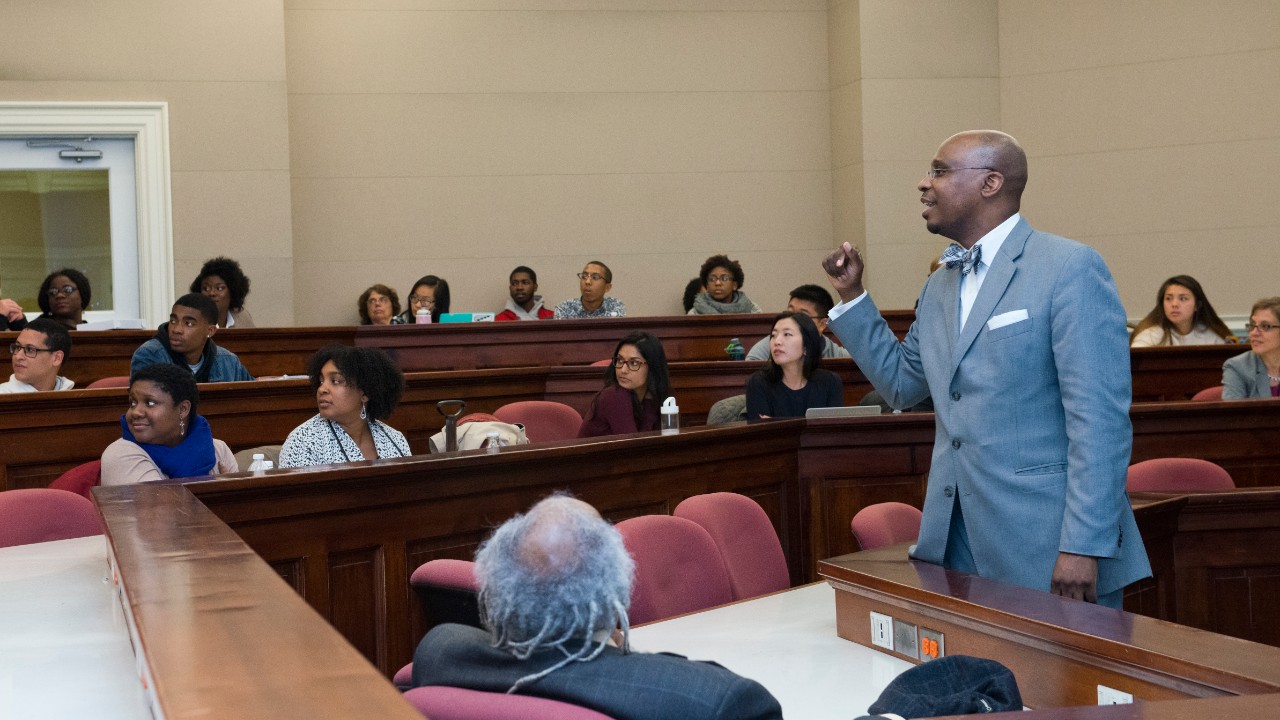


Rethinking the achievement gap
Photo by Lane McLaughlin October 28, 2016
Educators urged to account for disparities in opportunity
Bryant T. Marks Sr., an authority on educational outcomes of underrepresented students, told a University of Delaware audience that educators should focus less on the so-called “achievement gap” and more on the opportunity gap that underlies it.
Describing himself as a scholar-activist who strives to conduct serious research that can make a real difference, he spoke at UD on Thursday, Oct. 27. His talk, titled "If Opportunity Isn't Knocking, Then How Can I Achieve?" was part of the Center for the Study of Diversity fall lecture series on campus climate.
Marks, an associate professor of psychology at Morehouse College and director of the Morehouse Male Initiative there, said that the term “achievement gap” is often used to describe the differences in grades and standardized test scores among groups of different races, genders and socio-economic status.
Male African-American students, for example, have lower college graduation rates than other groups. But, while that fact might cause faculty and administrators to ask, “What’s the problem with those students?” they should instead ask what circumstances put the students into their particular situation, Marks said.
He cited research showing that minority students are more likely to attend high schools that offer fewer rigorous college-prep courses, employ less experienced and lower paid teachers and provide less academic mentoring and counseling. They also are more likely to come from families with lower socioeconomic status and are less likely to have college-educated parents.
All those factors create less opportunity for success in higher education, Marks said. “And they are all beyond the students’ control,” he pointed out.
“Many factors affect their college retention and performance before they ever arrive on campus.”
Achievement, dependent on a student’s hard work and talent, is an individual characteristic, he said. “But opportunity is situational: What is going on around these students that puts them in a position to advance and succeed?”
With America’s changing demographics, colleges and universities must find a way to boost opportunity for underrepresented groups of students, Marks said. And, he said, federal education officials are insisting on holding institutions accountable in finding solutions to the current gaps.
“If a university can figure out ways to recruit and graduate low-income, first-generation students, it will become a model,” Marks said.
Based on research, he suggested numerous initiatives that can improve outcomes for minority students. They include academically focused summer bridge programs to help new students adjust to the faster pace of instruction in higher education, mentoring programs, proactive advising and early alert systems when students first show signs of falling behind, learning communities and sound financial support. He also suggested limiting the number of extracurricular activities in which freshmen are allowed to participate.
Most of all, Marks said, universities need to collect data on student success in their own institutions, break it down by race and gender, and acknowledge the disparities and cultural biases that exist throughout American society.
“You can’t address a problem unless you understand it,” he said.
More about the speaker and the lecture
Marks serves on President Obama’s board of advisers with the White House Initiative on Educational Excellence for African Americans.
He also recently served as a senior adviser with the White House Initiative on Historically Black Colleges and Universities and currently is the inaugural senior research fellow with the Campaign for Black Male Achievement. In addition, he is a contributor to the White House My Brother’s Keeper (MBK) and serves on the MBK Task Force for Fulton County, Georgia.
As part of the President’s 21st Century Policing Initiative, Marks provided implicit bias training to more than 700 police chiefs via a series of White House gatherings. He serves on several national boards and is a highly sought after speaker and trainer.
Marks earned a bachelor’s degree in psychology and a minor in economics from Morehouse College, and master’s and doctoral degrees in social psychology from the University of Michigan.
The lecture was presented in collaboration with the vice provost for diversity, the Center for Teaching and Assessment of Learning, the Center for Black Culture and the colleges of Arts and Sciences and of Education and Human Developm
Contact Us
Have a UDaily story idea?
Contact us at ocm@udel.edu
Members of the press
Contact us at 302-831-NEWS or visit the Media Relations website

